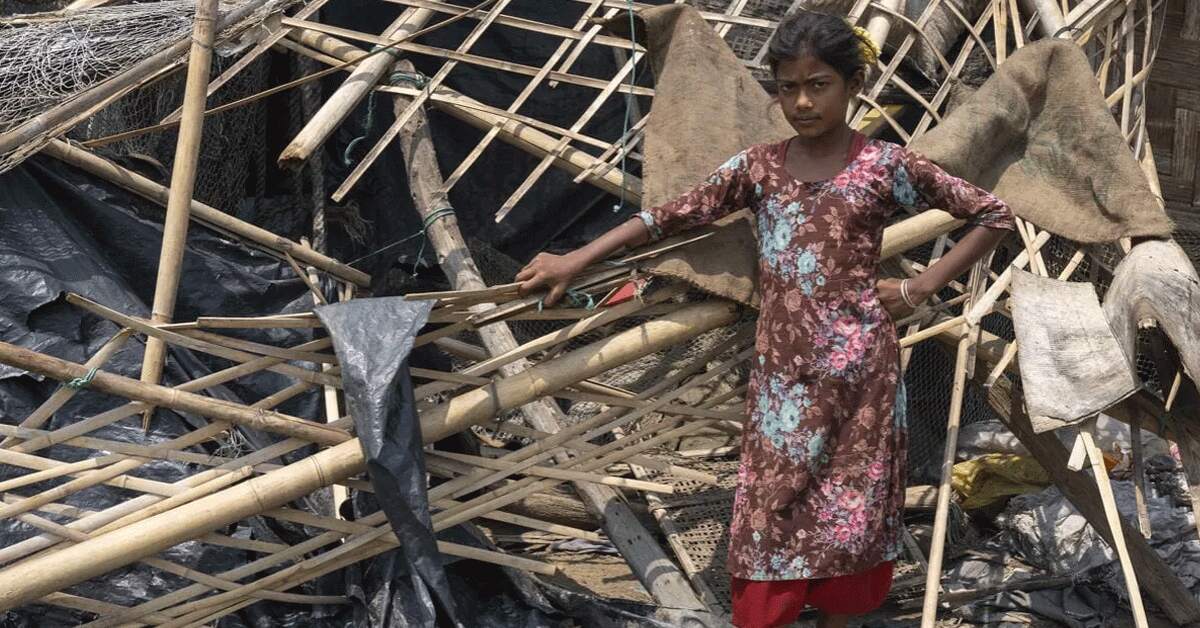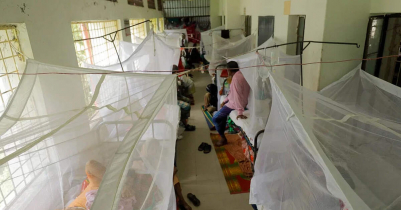Staff Reporter
Millions of children risk in BD in the aftermath of Cyclone Mocha

The trail of destruction left by Cyclone Mocha in parts of Bangladesh and Myanmar is causing severe disruption to the lives of millions of vulnerable children and families, including many already living in dire conditions, says UNICEF on Wednesday.
Even as the worst of the storm has passed, the risk of landslides remains high, and further dangers, including waterborne diseases, will likely grow in the days ahead.
Cyclone Mocha hit the coastlines of Bangladesh and Myanmar on 14 May, at around 15:00 local time, bringing heavy rainfall, storm surges, and strong winds reaching 175 mph.
"Some of the world's most vulnerable children and families are, yet again, at the sharp end of a crisis they didn't create. The areas hit hardest by the storm are home to communities already living through conflict, poverty, instability, and climate and environmental shocks," said UNICEF's Executive Director Catherine Russell.
"As we urgently assess and respond to the immediate needs of children in the aftermath of this cyclone, we know with certainty that the best way to save and improve the lives of children and their families is by finding long-term solutions."
In Bangladesh, home to the world's largest refugee camp in Cox's Bazar, one million Rohingya refugees faced the brunt of the heavy storms, half of them children. The refugee camps rank among the most tightly packed places on earth, exposing children to conditions ripe for disease, malnutrition, neglect, exploitation, and violence. The camps are also prone to mudslides, and children live in fragile temporary shelters.
Cyclone Mocha has tied with 2019's Tropical Cyclone Fani as the strongest storm ever recorded in the North Indian Ocean. Scientists recently found that, while disaster management efforts have reduced the number of deaths during cyclones in recent years, climate change is threatening this progress. They noted that escalating frequency and intensity of storms will pose a far greater risk to Bangladesh in the coming decades.
While Cox's Bazar was spared the eye of the storm, thousands of people have been affected and several temporary shelters, facilities, and infrastructure that refugees have been provided have flooded and left severely damaged due to heavy winds and rains.
Timely and urgent humanitarian access to the affected areas in both countries is critical.
UNICEF is on the ground, assessing needs, and providing emergency relief. Together with local partners, UNICEF is prepositioning and deploying supplies in Bangladesh and Myanmar to ramp up our response services, including water and sanitation, child protection, health, nutrition, and education.
By late Sunday, the storm weakened, leaving behind destroyed homes, health facilities, schools, and other critical infrastructure.
Many of the hundreds of thousands of people affected are refugees or internally displaced people (IDPs), living in poorly structured shelters in camps and hard-to-reach areas.
They rely heavily on humanitarian assistance for food, water, health, education, and protection.
The situation is particularly worrisome in Myanmar. More than 16 million people – 5.6 million of them children – including 1.2 million internally displaced people of Rohingya, ethnic Rakhine and other communities, were in the path of the cyclone in Rakhine State, and locations in the north-west including Chin State and Sagaing and Magway Regions.
The areas are low-lying and highly prone to flooding landslides.
Assessments of the extent of the damage in Myanmar are challenging, largely due to interrupted transport and telecommunication services and inaccessibility of some roads due to trees falling and debris.
However, early reports show that children were reportedly among the victims of the storm.
Read More
- A fire broke out in Bongo Bazar
- Takrim again first in the International Quran Competition
- Bangladesh Chhatra League full committee announced
- Today is the birthday of the father of the nation
- Enayetullah Abbasi may be banned in UK!
- Sheikh Hasina will be elected for the fourth term : Bloomberg
- Fire in Bongo Bazar: Mamun lost everything
- I will help victims of Bongo Bazar : Prime Minister
- UK PM sees Sheikh Hasina as his inspiration
- Fire in Bongo Bazar : DSCC forms probe committee






























